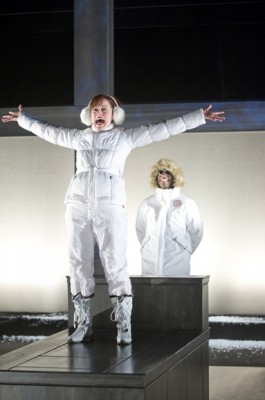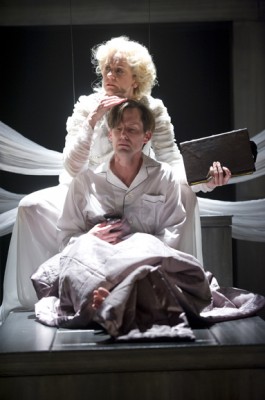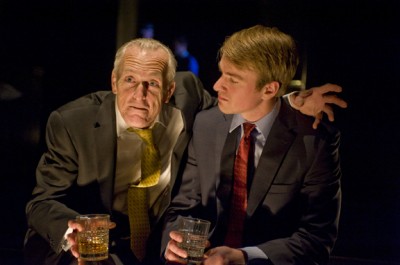Angels in America (Parts I and II)
Written by Tony Kushner
Directed by Charles Newell
At Court Theatre, Chicago
A Sweeping Epic of Grand Themes and Intimate Portraits.
(Note: This review will be a melding of two reviews for both Parts I and II of Angels in America.)
One of the most revered plays of the 20th century gets a world-class production at Court Theatre’s revival of Tony Kushner’s magnum opus Angels in America. Subtitled A Gay Fantasia on National Themes, it’s technically a diptych, “Part 1: Millenium Approaches” and “Part 2: Perestroika.” With a masterful direction and powerhouse cast, it’s a rare show that meshes on every level. No detail is overlooked—from casting to lighting to scenery—Angels maintains remarkable clarity for a work of such multilayer complexity and nuance. Exploring the peculiar zeitgeist of America in the mid-1980’s, it focuses on the seismic shifts of a country with a severe identity crisis fitfully attempting to live up to its own expectations and pulls them out into a timeless story with important lessons for any age.
 As a professed fantasia, it’s more intriguing to go in with little foreknowledge of what’s about to happen, so I’m going to paint in relatively broad strokes. Half the fun is seeing Kusher’s improvised mythos create a free-form world of lives intersecting in their spiritual flotsam. Where else can you see a Valium-induced hallucination collide with a religious vision? With eight characters playing multiple roles, Angels’ two parts weaves into an exploration into the depths of what it means to be in America and what destiny was manifested by those who must take up the journey of forebears who came from other lands to a “melting pot where nothing melted.” The emerging HIV/AIDS pandemic, the Cold War, homosexuality, racism, conservatism, liberalism, religion, abandonment and more collide in tableaux both domestic and cosmic. It’s comedy and drama mingled with allegory and realism in a truly stunning multi-faceted jewel.
As a professed fantasia, it’s more intriguing to go in with little foreknowledge of what’s about to happen, so I’m going to paint in relatively broad strokes. Half the fun is seeing Kusher’s improvised mythos create a free-form world of lives intersecting in their spiritual flotsam. Where else can you see a Valium-induced hallucination collide with a religious vision? With eight characters playing multiple roles, Angels’ two parts weaves into an exploration into the depths of what it means to be in America and what destiny was manifested by those who must take up the journey of forebears who came from other lands to a “melting pot where nothing melted.” The emerging HIV/AIDS pandemic, the Cold War, homosexuality, racism, conservatism, liberalism, religion, abandonment and more collide in tableaux both domestic and cosmic. It’s comedy and drama mingled with allegory and realism in a truly stunning multi-faceted jewel.
“Part 1: Millenium Approaches,” opens in 1985 with a funeral. A rabbi sets the tone with a touching homily over the body of a woman he never knew but whom he does know because of the journey she took as an immigrant to America. It’s a voyage that doesn’t exist anymore in this world. A voyage where she brought the world she came from on her shoulders and set it down on new soil. It is up to her descendants (among them her grandson Louis, who abandoned her long before death) to carry on the nobility of this journey inside them.
Prior (Rob Lindey) is the 32nd person to bear his name and probably the last since as a gay man with no progeny. Louis (Eddie Bennett) is his boyfriend of four years. A faux East Coast intellectual, he is having decided difficulty coping with Prior’s onset of AIDS. Unable to take the burden of illness, he continues his old habits and runs just as Prior begins having strange visions. Are they real, or just a delirium from the medications?
Elsewhere, the nefarious lawyer Roy Cohn (Larry Yando), a real-life McCarthyist proponent and a relic of a shameful age long past, is diagnosed with AIDS (this actually happened). His protégé Joe (Geoff Packard) is a painfully moral mormon with a Valium-addicted and alienated wife Harper (Heidi Kettenring). Roy is priming Joe to take not only his place, but a position with enough power to ensure he dies of “liver cancer” still a lawyer. As Roy’s health declines, he gets a macabre deathwatch from Ethel Rosenberg, the woman he helped get the chair for communist treason. Joe must wrestle with demons inside himself as he tries to keep his marriage alive while coping with his own latent homosexuality. It’s clear Roy picked him because he knows a man like Joe who can keep a secret that big and suppress it is worthy to carry on a legacy where you have no friends; just secrets, agendas and favors to exploit for power and clout.
It ends on a cliffhanger, as Prior’s visions become two eponymous ancestors. They died of the plagues that infested their own ages, reminding us that HIV/AIDS is just the most recent scourge in a long line. Together they flit from the past to herald the coming of an angel, and just as she triumphantly descends over Prior’s bed, Part I concludes.
 “Part 2: Perestroika,” shows Prior relating to his best friend and nurse Belize (Michael Pogue) what happened the night of his heavenly visitation. The angel (Mary Beth Fisher) has some new additions to theology. God, it would seem, has abandoned his creation after the great San Francisco quake of 1906. Since then, his angels—no more than glorified bureaucrats—have attempted to keep creation on track but lack the imaginative faculties to perceive the potentials of change. Man’s progress throughout the 20th century has caused earthquakes in Heaven, and they selfishly want to turn Prior into a prophet for a single command they hope will end the crisis the only way they know how: “STASIS!” Prior must preach to the world that change is bad and progress must be halted. It’s not a charge he neither comprehends nor desires.
“Part 2: Perestroika,” shows Prior relating to his best friend and nurse Belize (Michael Pogue) what happened the night of his heavenly visitation. The angel (Mary Beth Fisher) has some new additions to theology. God, it would seem, has abandoned his creation after the great San Francisco quake of 1906. Since then, his angels—no more than glorified bureaucrats—have attempted to keep creation on track but lack the imaginative faculties to perceive the potentials of change. Man’s progress throughout the 20th century has caused earthquakes in Heaven, and they selfishly want to turn Prior into a prophet for a single command they hope will end the crisis the only way they know how: “STASIS!” Prior must preach to the world that change is bad and progress must be halted. It’s not a charge he neither comprehends nor desires.
His ex Louis has since found consolation in another exile from the bondage of a significant other in Joe, who has fled Harper. They are clinging together in fitful desperation, trying to justify their cowardice and face each other instead of the pain of what they could not face. This leaves Prior to wander the streets with his new angelic mission. His explorations lead him to the increasingly deranged Harper, another abandoned soul trying to cope with still loving something that can’t love back. She’s contending with her mother-in-law Hannah (Hollis Resnick), recently arrived to put her son and the marriage back in order and providing some of the most hilarious insights from her acerbic pedestal.
Back in the hospital, Ethel continues her gloating death watch over Roy while nurse Belize tries to understand his compassion for this vile man who hates gays as much as he hates communists and black people. Through their interactions with a dying villain, they both gain an insight into the nature of forgiveness.
Each of these characters, both natural and supernatural, inhabit their own pathetically self-contained worlds. Each has a tectonic difficulty brushing up against other fault lines in a microcosm of the American experiment in homogeneity. It’s a massively challenging work for actors and audience alike, and the cast is one of the most superlative you’re likely to find anywhere. Yando deserves special recognition for his Roy Cohn, creating a viperous man who is against all odds pitiable and wryly hilarious in his death throes. Lindley is a wonder as Prior, a gay man coping with not just AIDS and abandonment but given the monumental duty of dealing with the “virus of time.” Top-notch behind the scenes work creates a staging of stark economy and versatility to keep the characters ever forefront, while Newell’s direction keeps a steady hand that makes the approximately 6-hour production (total for both parts) seem breathtakingly quick.
Part time capsule and part eternal fable, Angels is so grand in scope it’s hard to take in all at once. Kushner has painted both a sympathetic and polemical portrait of an America at odds with itself at a critical juncture in its history. Full of insight of heartbreaking poeticism, Angels is a wondrous journey that may leave you permanently altered as its lessons on love, humanity and forgiveness continue to immigrate into that vast continent of the self. Taken at separate times or together, this is a complex work that is quite simply a must see.
Highly Recommended.
Review by Clint May
Date Reviewed: April 14, 2012
At Court Theatre, 5535 S Ellis Ave, Chicago, IL; call 773.753.4472 or visit www.courttheatre.org; tickets $45-65 with discounted package rates; running time 3 hours Part 1 with 2 intermissions, running time 3 hours with 2 intermissions Part 2; through June 3.


